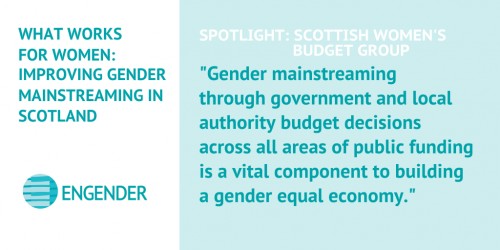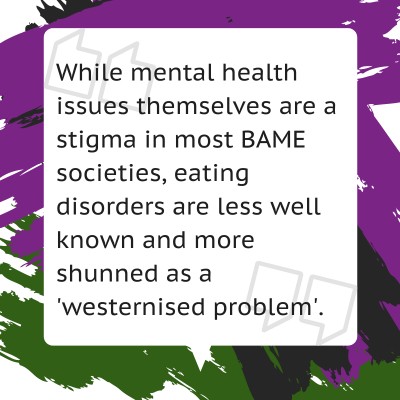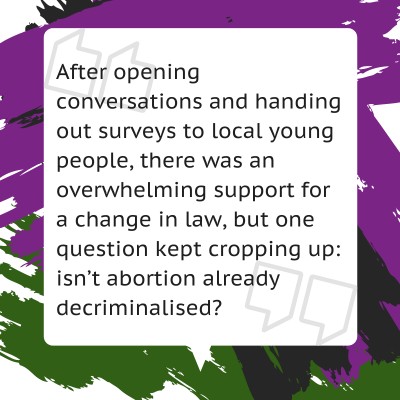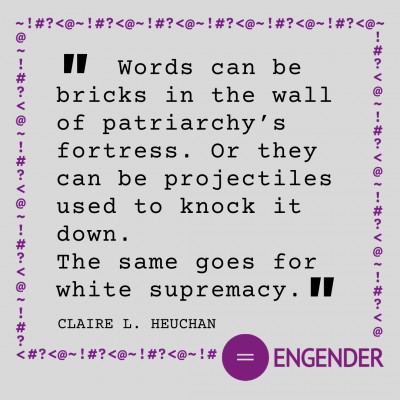Engender blog
All of Engender’s latest news. Reports, reviews, books, articles, and information from across Scotland’s women’s sector.
We would love to hear from other feminists around Scotland. Check out our guidelines for more information on how you can blog for us.
Guest Post: Mainstreaming Spotlight - Scottish Women's Budget Group
To mark the release of Engender's new report, What Works for Women: Improving gender mainstreaming in Scotland, we're sharing how mainstreaming is important to the work of some of Scotland's equalities organisations. Here, Sara Cowan from the Scottish Women's Budget Group talks about how mainstreaming is a vital component of creating a gender equal economy. Why is gender mainstreaming important to your
organisation?
Why is gender mainstreaming important to your
organisation?Women and men use public services differently – they have different life experiences and face different economic realities and challenges. Women are often disadvantaged by policies that do not recognise these different experiences. Gender mainstreaming is important to us to redress this balance when decisions are made across a range of public services.
Guest Post: Mainstreaming Spotlight - CRER
To mark the release of Engender's new report, What Works for Women: Improving gender mainstreaming in Scotland, we're sharing how mainstreaming is important to the work of some of Scotland's equalities organisations. Here, Carol Young from the Centre for Racial Equality and Rights (CRER) talks about how they use an intersectional approach in their mainstreaming work.Why is gender mainstreaming important to your organisation?While CRER is an anti-racist organisation and our work is primarily focused on race equality, we adopt an intersectional approach where possible. People’s identities are multifaceted, and everyone has multiple protected characteristics, so it's not feasible to get mainstreaming right for one characteristic without considering the others.
GUEST POST: Mainstreaming ambition
Louise Macdonald, OBE, is the co-chair of the First Minister's National Advisory Council on Women and Girls. The focus of the Council this year is 'gender architecture', a key part of mainstreaming gender. To mark the launch of our report What Works for Women: improving gender mainstreaming in Scotland, we asked Louise to blog for us on the work of the council during 2020.Making gender inequality a historical curiosity is an ambitious vision – but sadly a necessary one.
F-words: Finn McKay on gender ideology
Dr Finn Mackay is a sociology lecturer at the University of the West of England in Bristol and author of ‘Radical Feminism: Feminist Activism in Movement’. Here, ahead of the release of her new book 'Female masculinities & the gender wars’, Dr Mackay explores the term ‘gender ideology’ and what it means for feminism in the UK.
-400.png)
GUEST POST: Food for thought
Dr Shridevi Gopi-Firth is a Speciality Doctor in Eating Disorders working in Scotland. Her international education and career, including third sector work across India, Russia and the UK have given Shri a wide exposure to diverse cultural, social, educational and healthcare settings, thus successfully complementing her lived experience and clinical skills to develop a holistic understanding of the person. Here, she explores how stigma around eating disorders can affect women in BAME communities.

F-words: Emojis can be feminist too
Amy King is a PhD researcher at Edinburgh Napier University and Digital Officer at YWCA Scotland - The Young Women’s Movement. Her PhD investigation into online violence and the mechanisms of harm in language often take her research to weird and wonderful places, including contemplating the harm - and hope - of the humble emoji.-400.png)
Do you remember the first time you used an emoji? I have to admit, I don’t. But I do remember the first time my Mum sent me one, about 7 years after they had become a mainstream element in digital communication. Now I’m priming her for the GIF library on WhatsApp. I’m lucky, though - my Mum has never sent me the wrong emoji before, like a crying laughing emoji in a sombre context, or an awkward emoji shoehorned into a sentence to prove she’s ~down with the kids~. And that’s important because emojis carry specific meaning, have acceptable and unacceptable uses, and they often hold crucial extralinguistic detail that we rely on to ensure we’re understood properly.
F-words: The Many Languages of Transfeminism
Harry Josephine Giles is from Orkney and lives in Leith. Their latest book is The Games (Out-Spoken Press), shortlisted for the 2019 Saltire Prize for Best Collection. They have a PhD in Creative Writing from Stirling, co-direct the performance platform Anatomy, and are touring the poetry-music-video show Drone internationally. Here, they write about the history of 'transfeminism' as a word, and as a movement. Find out more about Harry Josephine at www.harryjosephine.com.
‘Knowing Me; Knowing You: Is this the best we can do for cohabiting couples?
Engender has responded to the Scottish Law Commission's consultation on reforms to the law governing cohabitation in Scotland. This blog, from Engender's Policy and Parliamentary Manager Eilidh Dickson, sets out why equality in cohabitation is a feminist issue.

F-words: Gendered language - the Maker movement and its technology narrative
Dr Elisabeth Loose has just finished her PhD thesis on the amateur technology Maker movement, its gender balance and connection to environmental sustainability at the University of Glasgow’s School of Interdisciplinary Studies. She has recently become self-employed to support charities and social causes with their communications. Follow Elli on Instagram at @elli.ellixir where she advocates for inclusive social impact marketing.
-400.png)
F-words: Language and gender in board games
Jenny Lester is a feminist writer and performer. She currently works at Equate Scotland, and has previously worked in women’s rights organisations and mental health charities. She completed an MA in Women’s Studies researching sex education, pleasure, and faking orgasms. She is a board game and TTRPG enthusiast and is passionate about bringing feminism into these spaces.
!["Board games are a piece of media that I hold close to my heart.[...] But, like all media, they exist within our culture so, in turn, display our culture back to us. This means they often show back sexism and inequality." Jenny Lester](/siteimages/Blog/resized/f-words-(16)-400.png)
F-words: the language of abortion
Dr Carrie Purcell is a Research Fellow in the Complexity in Health Improvement Programme, at the MRC/CSO Social and Public Health Sciences Unit at the University of Glasgow. Carrie also leads the Sexuality and Abortion Stigma Study (SASS). Head to Twitter to follow Carrie and the SASS project.As a sociologist, and a researcher who works on abortion, I spend a lot of time thinking about the language that’s used around abortion in everyday, medical, academic, media and advocacy contexts. This blog presents some of my reflections on that language.
F-words: Writing ourselves into existence
Raman Mundair is an Indian born, Queer, British Asian writer, artist, photographer and film maker. In this contribution to our F-words series, Raman explores the power that words can have in giving voice to experiences and identities so often ignored.Follow Raman on Twitter, Facebook and Instagram (@ramanmundair & @rmundair), and listen to her 'intersectional voices' work at Anchor.fm.Content note: this article discusses racism, childhood abuse, and victim-blaming.
![Black and brown women's perspectives [are] ignored, spoken over, co-opted or drowned out. A whole lexicon of lived experience wilfully erased.](/siteimages/Blog/F-words/resized/f-words-(14)-400.png)
F-words: Beyond a buzzword
This F-words blog from Talat Yaqoob shares why intersectionality must be much more than just a word. Talat is a freelance consultant specialising in gender equality, intersectionality, education and workplace equality, and political participation. Follow her on Twitter @TalatYaqoob.
-1596711527-400.png)
F-words: Words against stereotypes
Juliana da Penha is a freelance journalist and founder of Migrant Women Press, an independent media organization about women’s experiences with migration. Here she blogs for us about the stereotyping of migrant women, and the power of words to challenge that. Follow Migrant Women Press on Facebook, Twitter, and Instagram.
-400.png)
F-words: Virginity and Foreplay
Jenny Lester is a feminist writer and performer. She currently works at Equate Scotland, and has previously worked in women’s rights organisations and mental health charities. She completed an MA in Women’s Studies researching sex education, pleasure, and faking orgasms. In this 'F-words' blog, she'll be discussing the terms ‘virginity’ and ‘foreplay’ and offering some suggestions for less patriarchal alternatives.Content Note: this blog contains terminology around anatomy and sexual acts, and one instance of a censored swear-word.
Downloads
 Engender Briefing: Pension Credit Entitlement Changes
From 15 May 2019, new changes will be introduced which will require couples where one partner has reached state pension age and one has not (‘mixed age couples’) to claim universal credit (UC) instead of Pension Credit.
Engender Briefing: Pension Credit Entitlement Changes
From 15 May 2019, new changes will be introduced which will require couples where one partner has reached state pension age and one has not (‘mixed age couples’) to claim universal credit (UC) instead of Pension Credit.
 Engender Parliamentary Briefing: Condemnation of Misogyny, Racism, Harassment and Sexism
Engender welcomes this Scottish Parliament Debate on Condemnation of Misogyny, Racism, Harassment and Sexism and the opportunity to raise awareness of the ways in which women in Scotland’s inequality contributes to gender-based violence.
Engender Parliamentary Briefing: Condemnation of Misogyny, Racism, Harassment and Sexism
Engender welcomes this Scottish Parliament Debate on Condemnation of Misogyny, Racism, Harassment and Sexism and the opportunity to raise awareness of the ways in which women in Scotland’s inequality contributes to gender-based violence.
 Gender Matters in Social Security: Individual Payments of Universal Credit
A paper calling on the Scottish Government to automatically split payments of Universal Credit between couples, once this power is devolved to the Scottish Parliament.
Gender Matters in Social Security: Individual Payments of Universal Credit
A paper calling on the Scottish Government to automatically split payments of Universal Credit between couples, once this power is devolved to the Scottish Parliament.
 Gender Matters Manifesto: Twenty for 2016
This manifesto sets out measures that, with political will, can be taken over the next parliamentary term in pursuit of these goals.
Gender Matters Manifesto: Twenty for 2016
This manifesto sets out measures that, with political will, can be taken over the next parliamentary term in pursuit of these goals.
 Scottish NGO Briefing for UN Special Rapporteur on Violence Against Women
Joint briefing paper for the UN Rapporteur on Violence Against Women.
Scottish NGO Briefing for UN Special Rapporteur on Violence Against Women
Joint briefing paper for the UN Rapporteur on Violence Against Women.

Newsletter
Sign up to receive our newsletter here:
Sign up to our mailing list
Receive key feminist updates direct to your inbox:
-400.png)
-400.png)
-400.png)

